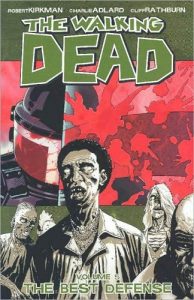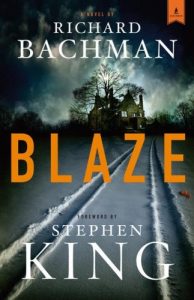 I’m kind of torn on the fifth Walking Dead graphic novel. On the one hand, The Best Defense returns to a plot-oriented focus, just as I predicted it would. And, even better, a cliffhanger ending all but precludes a volume 6 return to form in which all plot progression is halted in favor of character exploration. (Mind you, having both in the same volume would be pretty great, but except for our hero and his wife, that mostly hasn’t been happening.) But on the other hand, the plot that Kirkman has oriented on is kind of tired. I’ve liked how much dissension has come from within, contravening standard expectations; in so many apocalyptic stories, the characters are all united, and any outside groups are evil and/or crazy, hellbent on taking everything that these good people have built, if not destroying it outright instead. In any event, that destructive and moderately trite external influence is finally here.
I’m kind of torn on the fifth Walking Dead graphic novel. On the one hand, The Best Defense returns to a plot-oriented focus, just as I predicted it would. And, even better, a cliffhanger ending all but precludes a volume 6 return to form in which all plot progression is halted in favor of character exploration. (Mind you, having both in the same volume would be pretty great, but except for our hero and his wife, that mostly hasn’t been happening.) But on the other hand, the plot that Kirkman has oriented on is kind of tired. I’ve liked how much dissension has come from within, contravening standard expectations; in so many apocalyptic stories, the characters are all united, and any outside groups are evil and/or crazy, hellbent on taking everything that these good people have built, if not destroying it outright instead. In any event, that destructive and moderately trite external influence is finally here.
This is the downside of the zombie setting. Sure, you have all those zombies, but so many of the stories that you can tell against that backdrop have already been told. The best you can hope for is to tell it better, and with the current volume of writing available, that is getting harder and harder to accomplish. I’d hate to think I’m outgrowing this format? But if I had sat down to wonder what was missing from the Walking Dead mythos, this would have been the first plot twist that leapt to mind.
As far as the art, it at least is as good as ever. I am forced to complain about the lack of color, though. With all of the physically and emotionally wringing events they’ve been forced through, the characters’ faces are getting too busy. Where color would reveal exactly the difference between each scratch, scar, or wrinkle, black-on-white just results in character features that are more and more craggy, harder and harder to read accurately. And the art is simply too good to allow it to be reduced by something so trivial.




 For the first time in a reasonably large number of years, I’ve missed a buy-on-release-date book. I mean, I’ve chosen to wait occasionally, but this one I didn’t even know about until months later.
For the first time in a reasonably large number of years, I’ve missed a buy-on-release-date book. I mean, I’ve chosen to wait occasionally, but this one I didn’t even know about until months later.